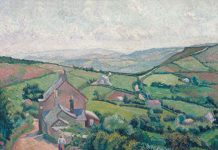The trail-blazing dramatist Ann Jellicoe will be 90 this year. Drawing on a candid interview Jellicoe gave to the British Library in 2005, Ines Cavill looks back at a rich creative life characterised by bold innovation and canny reinvention—an imaginative capacity to adapt to changing personal and professional circumstances that would forge new theatrical forms in the process.
Born in Middlesborough in 1927, Jellicoe loved performance and writing from a young age. She adored her junior dance class and creating charades at school. ‘From when I was four years old I wanted to go into the theatre, I didn’t have an easy childhood, my parents separated and the world of fantasy struck me early—that you could go into another situation….I would lie awake the day before a charade had to be put on at school and in my head I would write everything, the whole dialogue’.
She went on to the Central School of Speech and Drama where a key stimulus was improvisation, ‘there was a remarkable teacher—I remember seeing another student improvising a dream where he was playing a trumpet that turned into a bird and flew away… improvisation was the start of something quite new, it was like a door—an opening into a cavern you could explore’.
Despite having been a star student first acting jobs eluded her till friends got her a place in repertory in Aberystwyth, ‘I came out with Central’s chief prize but not being a pretty girl—in an age when we hadn’t had the Berliner Ensemble where plain girls were allowed to be interesting—I didn’t immediately get work’. But Jellicoe was just plain passionate about all aspects of theatre and would soon be more involved in creating plays than acting in them. In 1949 she was commissioned to make a fascinating study of the relationship between acting and the theatre’s architecture. Unconscious Influences on the Theatre led her to work with ‘Open Stage’ and at the Sunday (Cockpit) Theatre Club she would produce and direct plays that explored this form, including a first one-act play of her own.
Jellicoe’s big career breakthrough came in 1955 when she was the runner up in The Observer’s playwriting competition—a search for new talent by their acclaimed theatre critic Kenneth Tynan. ‘It was wonderful! The phone rang and within 24 hours you were having lunch with the directors of the Royal Court Theatre and their designer is coming round to your room with a model… it was unbelievable’. At The Royal Court she would be the only woman in its innovative Writers’ Workshop.
Her radical winning play The Sport of My Mad Mother took its title from the Hindu religious saying ‘All creation is the sport of my mad mother Kali’. Set in Cockney London it used absurdist dialogue and physical theatre to weave a fantastical tale of young misfits. Initially a commercial failure that lasted only 14 performances, it was later performed around the world in many languages and is now considered ripe for a British revival. The Guardian theatre critic Michael Billington wrote in March 2014, ‘it’s a mind-blowing piece that combines social anarchy with verbal jazz and ends with a triumphant hymn to female fertility… The Knack also deserves another look, but it is this one that showed her to be a radical theatrical pioneer’.
With typical responsiveness Jellicoe changed tack in the face of this initial blow to her confidence—with starry Sixties results. ‘The reception of that play was like being cannoned into a brick wall, so I thought I better write a comedy’. That 1962 comedy, The Knack, was a massive hit at The Royal Court and Off Broadway where it would play 685 shows under the direction of Mike Nichols. ‘Without doubt it was the most exciting time of my life. The 60s were beginning to swing and anything seemed possible at The Court. I wrote The Knack whose characters all grew from people I knew. Rita Tushingham was wonderful, she could mime anything, just do it off the top of her head. George Devine, the artistic director, was an extraordinary man—referring to the title of my first play he once said “I regard myself as your mad uncle”’. The Knack also gave her a memorable telephonic run-in with The Lord Chamberlain looking to exercise the last reprimands of the dying censorship powers from the 1843 Theatres Act; ‘Oh haw haw haw Miss Jellicoe I’m afraid this is going to be a rather difficult conversation’, so it went something along the lines of ‘If I take out “bum” will you allow so and so?’ Occasionally somebody did walk out of The Knack and they were heard to say in the foyer ‘But mother, I can’t hear anything dirty!’. And although the play’s focus is the sexual competition among three roommates when a provincial young woman enters their London world, Jellicoe insists ‘it seems to be about sex—what it’s really about is how people should treat other people’.
The Knack’s star continued to rise with its successful adaptation to the big screen in 1965, winning the Palme D’Or at that year’s Cannes Film Festival. Director Richard Lester was between making A Hard Day’s Night and Help, putting The Knack in a pivotal Sixties stylistic spot—it’s full of French New Wave influences and Lester’s visual trademarks like subtitles and shot repetition. It even features three icons—Jane Birkin, Jacqueline Bisset and Charlotte Rampling—making their cinematic debuts as extras. Rita Tushingham revives her central role as Nancy, the contemporary young woman whose wit and warmth would chime with 1966’s Georgy Girl. The shy schoolteacher Colin, so desperate to gain his lodger’s ‘knack’ with the opposite sex, is played by a young Michael Crawford honing the accident-prone persona that would become Frank Spencer in the BBC sitcom Some Mothers Do ‘Ave ‘Em.
The Knack was partly based on Jellicoe’s second husband Roger Mayne, whose stunning street photography mirrored her ‘theatre of demonstration’; a shared intention to show not tell. ‘Roger had a house like Colin’s, I was living with him and he had a lodger like Tom and a hilarious character just like Tolen who obviously tried to make a pass at me and he got nowhere! We moved from ‘The Knack’ house on Addison Ave to a very nice house in Richmond because you couldn’t have brought a child up there. We also had a cottage in Dorset, an absolutely idyllic place with roses round the door and thatch—we would pile everything into the car at any opportunity and we so hated going back to London. I just got fed up with London and I assumed I would just go on writing plays…’
They made the permanent move to Colway Manor in Lyme in 1975 after her last role at The Royal Court as literary manager promoting women playwrights including Caryl Churchill. But how was Jellicoe to go on writing plays? She enjoyed creating dramas for younger children (a series of ‘Jelliplays’) that were attuned to the ages of their son and daughter, Tom and Katkin, and as they settled in school in Lyme she imagined a much more ambitious production, The Reckoning. It proved too big for a secondary school to stage and as it grew to involve an eighty-strong local cast of all ages a powerful template emerged from this first Community Play: an original work written for and about a particular community, performed in shared space for audience and cast and staged by a professional production team. Jellicoe went on to form the Colway Theatre Trust and produce two decades of work exploring this form from Dorset to Denmark.
‘And so I lived happily ever after and did I don’t know how many plays…’
As part of the Sixties theme within this year’s From Page to Screen Film Festival in Bridport there will be a screening of The Knack at the Bridport Arts Centre at 2pm on Sunday April 23. Ann Jellicoe will reflect on the original play and its adaptation with her daughter Katkin Tremayne and there will be a display of her late husband Roger Mayne’s photographs from the play—retrospectives of his work are also currently on show at the Photographers’ Gallery in London and at the Thelma Hulbert Gallery in Honiton.
But looking forward, it is the spirit of community theatre that Jellicoe nurtured in West Dorset which continues to thrive. The Dorchester Community Plays Association have announced that their 7th play will be a new commission by the playwright Stephanie Dale. In Lyme Regis the Monmouth Community Play will be staged at the Marine Theatre and seafront in July. Bridport is producing the very next piece of community theatre, FLEA! at The Electric Palace 23-27 May—written by Andrew Dickson who first encountered the town through the early Community Play The Poor Man’s Friend.
These three current local productions reflect the enduring influence of a creative visionary who has enabled so many to see differently.
‘That white horse you see in the park could be a zebra synchronised with the railings….’









